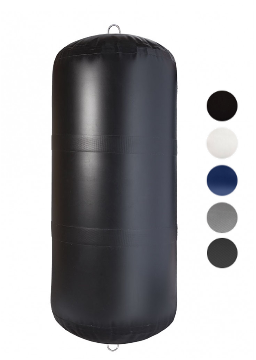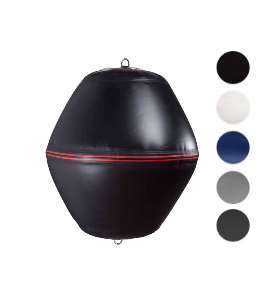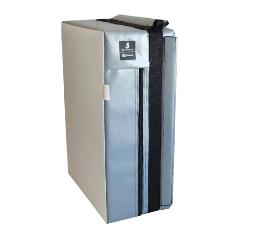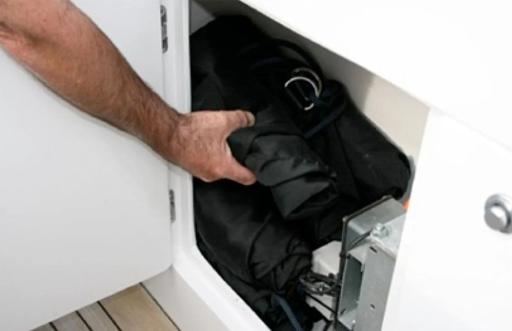Boat fenders, sometimes known as boat bumpers, are an essential piece of equipment for protecting the hull from contact with docks, pilings or other boats. They are an essential for avoiding damage to your boat and other boats around you. This blog will take you through the basic types of fenders, and help give you an estimate of exactly how many fenders, and what size, you need for your boat.
Boat Fender Types
There are three main types of boat fender, each type has its strengths and weaknesses.
Cylindrical Fenders

Cylindrical fenders are the most common fenders, suitable for hanging off the side of the hull.
These boat fenders can be hung vertically when mooring against docks or other flat structures, alternatively, they can also be hung horizontally to avoid collisions with pilings and other protruding structures, or to prevent roll off.
Round Fenders

Round fenders are great for protecting areas of the boat that may be further from the dock, such as the stern or bow, because they cover a much larger surface area. It’s also a good idea to have a round fender on hand to protect against other boats or obstructions during manoeuvres.
Flat Fenders

Finding popularity in race boat world, there are an increasing number of flat fender options available on the market. Similar to cylindrical fenders, flat fenders are suitable for hanging from the hull in either a horizontal or vertical position. They are more compact than cylindrical fenders, do not suffer from rolling around and they are even a comfortable retrofit bed to sleep on when racing offshore!!.
How big should my boat fenders be?
The rule of thumb is that a cylindrical fender should have approx. 3 cm of diameter for every 1.5 metres of boat length.
A round fender should have approx. 6cm of diameter for every 1.5 metres of boat length.
You may need to adjust this if you are mooring in particularly challenging conditions or if your boat is particularly heavy.
How many boat fenders do I need?
We recommend all boats carry a minimum of 3 fenders, and at least 1 fender for every 10 feet of waterline length. Therefore a 20ft boat should have 3 and a 40ft boat should have 4 fenders, as a minimum
There are three important variables to consider when choosing which boat fenders, and how many, to choose for your boat; boat length, boat weight and mooring conditions. So the following table is only a very general guideline, based on a medium displacement mono-hull.Most fenders are relatively lightweight and cheap when compared to the damage that could come from not having enough, so it’s always better to have too many than too few!
| Boat Length (m) | Cylindrical / Flat Fender Diameter (cm) | Round Fender Diameter (cm) | Recommended Number of Fenders |
Under 5m | 10 | 20 | 3 |
| 6 | 12 | 24 | 3 |
| 8 | 15 | 30 | 4 |
| 10 | 20 | 40 | 4 |
| 12 | 25 | 50 | 5 |
| 14 | 30 | 60 | 5 |
| 16 | 35 | 70 | 6 |
| 18 | 40 | 80 | 7 |
Most boat fenders are relatively lightweight and cheap when compared to the damage that could come from not having enough, so it’s always better to have too many than too few!
Boat Fender positioning
Hang your fenders from a suitable anchor point such as a stanchion or a cleat. You should have your fenders spaced apart with the central fender at maximum beam. Any round fenders will most likely need to be placed closer to the bow and stern, where the hull is further from the dock. Try and tie your fenders as low as possible to reduce swinging.
Position your vertical fenders so the bottom of the fender is just above the waterline. This will ensure the fender does not rise up over the dock and let it come in to contact with your boat. Do not position them too low, or they will start growing seaweed quite quickly!.
Cleaning and stowage of Boat Fenders
Many of our boat fenders use modern materials, rather than traditional hard rubber/plastic, which allows them to be inflated and deflated for storage. It’s a good idea to stow them somewhere out of the way, but also easily accessible, if the fenders are needed in a hurry.

We recommend cleaning boat fenders with normal soap and water and refraining from using harsh cleaning agents such as acetone. Or, if you really want to protect your fenders, many of our brands also have fender covers available, to protect your fenders from UV and make cleaning even easier.
Conclusion on Boat Fenders
In our view, it’s always better to invest in some great fenders and protect your boat, rather than risk damages and expensive trips to the repair yard. Make sure you buy an appropriate number of fenders and even some extras just in case.
If you have any questions about boat fenders, please feel free to email us at [email protected], or click the link below to see our full range:


How many boat fenders do I need? – A complete guide